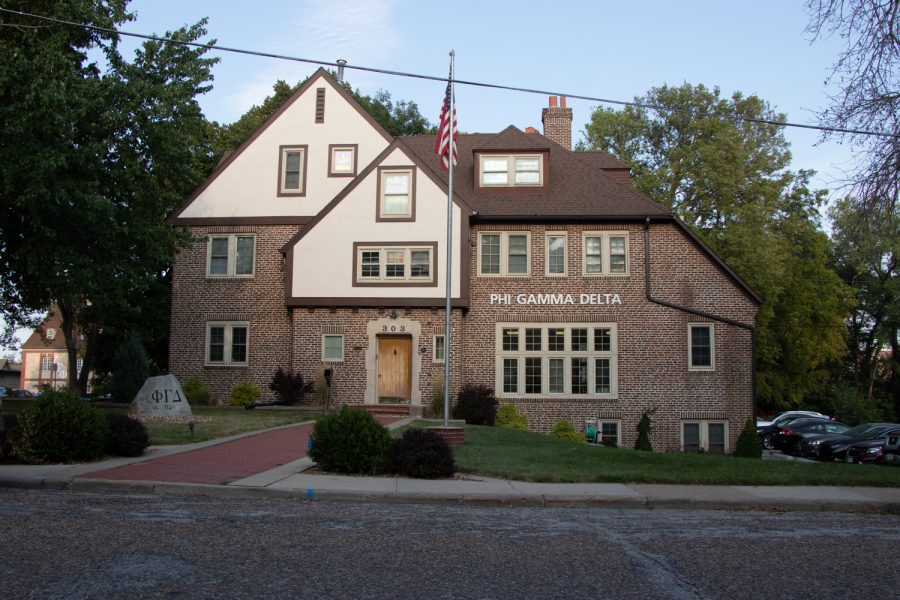Police served multiple warrants against FIJI and its members last year, court records show
Police received DNA swabs, phone materials, and surveillance videos in multiple searches last year after a reported sexual assault. Court records do not reflect that any charges were filed.
The Phi Gamma Delta house is seen on Monday, Aug. 30, 2021.
September 2, 2021
Editor’s note: this article contains references to sexual assault.
Iowa City Police executed search warrants against the Phi Gamma Delta fraternity house and members in September 2020, according to search warrant applications obtained from the Iowa Court website. Court records do not reflect that any charges have been filed against the two individuals who were accused of assault.
An online petition describing the alleged sexual assault from last September began circulating this week, garnering more than 100,000 signatures and sparking three consecutive nights of protests against the fraternity and the University of Iowa.
In multiple search warrant applications in September 2020, police describe that they received a report of a sexual assault from Makena Solberg, a University of Iowa student, that happened at the Phi Gamma Delta fraternity house at 303 Ellis Ave.
The Daily Iowan received permission from Solberg to use her name in its reporting. Eashaan Vajpeyi, an attorney representing Solberg wrote in a statement to the DI that he was disappointed in the lack of criminal charges in the investigation, and said he was planning to file a civil lawsuit on her behalf.
“In 2020, my client was drugged and sexually assaulted at a University of Iowa fraternity event by fraternity members,” he wrote in a statement to the DI. “The assault was filmed and the video shared throughout campus. We are disappointed in the lack of criminal charges. We will be filing civil litigation on her behalf against any participant, as well as any organization whose inaction failed to prevent or properly address this assault.”
Police first applied for a search warrant for DNA swabs of two members of the fraternity, commonly known as FIJI, on Sept. 14, 2020. The application stated police had collected clothing worn by Solberg on the night of the reported incident and were seeking to obtain cheek swabs from the individuals, which “could be exculpatory or inculpatory evidence.”
According to the search warrant applications, Solberg told police that she attended a party at the house on Sept. 5, and woke up the next morning with no memory of the night before and bruising on her legs and arms.
Solberg was told by friends there was a video circulating within the fraternity of the two men “having sex with her,” the documents say.
Documents say Solberg was contacted by members of FIJI, including the men in the video, telling her not to contact the police.
Detective Eric Neiland, who was investigating the case, spoke with four people with possible knowledge of the events of Sept. 5, the court documents show, including one member of FIJI who said he had been sent Snapchat photos of the two FIJI members now accused of assault having sex with a woman, according to the search warrant application.
The documents also say the FIJI member “had a Group Me message from possibly the fraternity President. The message advised members to delete the pictures going around.”
The first search warrant application was approved, and on Sept. 15, officers collected DNA samples of both men accused in the report.
In a later application seeking approval to retrieve video from the fraternity’s surveillance system, officers wrote that they also searched the two men’s phones pursuant to a search warrant. Officers located a photo on one of the phones “which corroborates a photo described by” one of the witnesses, the warrant application says.
“Surveillance video may assist in developing a timeline of events leading-up to and after the reported incident,” the application stated. “Further, surveillance video may assist in showing intoxication levels of persons present during the reported incident.”
Later on Sept. 22, officers got permission for and served the warrant at the FIJI house, seizing a DVR box which held surveillance video.
Charges have not been filed in relation to either search warrant.
In a news release on Wednesday, the Iowa City Police Department and the County Attorney’s office asked for information relating to the allegations, but they did not provide details about the investigation that had already taken place into the accusations.
“The Department has previously and will continue to work closely with the Johnson County Attorney’s Office on this case. We have and will continue to take allegations of sexual assault seriously and will investigate them to the fullest extent,” the statement said.
Johnson County Attorney Janet Lyness said she could not comment on the investigation when the DI asked for more information.
“I will let you know that a search warrant affidavit reflects an investigation at a certain time, not necessarily the full investigation,” she wrote in an email to the DI.
In a statement from the UI’s Interfraternity Council, council President Will Hochman said the two members accused of the assault had been removed from the fraternity in September 2020.
“Sexual assault or harassment is not something that the University nor the Interfraternity Council takes lightly, as it is unacceptable and must be eradicated from our campus,” the statement said. “On September 13th, 2020, Phi Gamma Delta (FIJI) removed two members from their chapter related to the incident.”
Protesters have been calling on the University of Iowa to shut down the fraternity after the allegations resurfaced. People who protested outside the President’s Residence on Wednesday told the DI they thought the university should be doing more to investigate the allegations.
The UI has not confirmed whether an investigation into the accusations had taken place or is taking place.
In a statement from President Barbara Wilson provided to the DI by UI spokesperson Jeneane Beck, Wilson said she was sorry students felt unsafe on campus.
She said she was committed to trainings to prevent sexual misconduct and to investigating when incidents occur.
“Our processes for investigating cases of alleged misconduct are confidential to protect the privacy of those involved and ensure a fair process,” Wilson wrote. “This confidentiality can sometimes make it feel like nothing is happening when in fact we have a committed team of professionals that responds to every allegation and concern. There are times too when individuals involved decide they do not want to engage with university professionals or utilize the complaint resolution process. But we must and will respect individual choices about how to engage.”
Resources for victims of sexual assault
- RVAP Crisis Line: 319-335-6000 or 800-228-1625
- Women’s Resource & Action Center: 319-335-1486
- National sexual assault hotline: 1-800-656-4673
- Iowa Sexual Abuse Hotline: 800-284-7821















